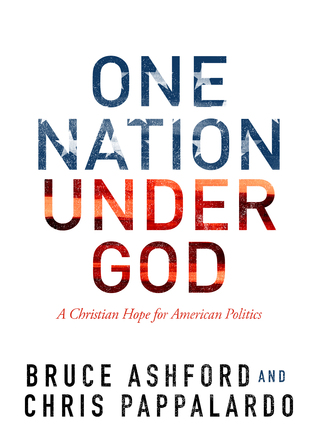
One Nation Under God: A Christian Hope for American Politics, Bruce Ashford and Chris Pappalardo. Nashville, TN: B & H Academic, 2015.
Summary: Explores whether and how it is appropriate for Christians in the American context to engage in politics, how one brings one’s faith into this, and applies this to seven contemporary issues.
Politics is front and center in the United States of America as the presidential election season comes to a conclusion*. The question of how people of faith engage in the political process is a larger question than just how we pursue electoral politics. Whether and how we engage our political processes is a question over which Christians have pondered from New Testament times down to the present. What Ashford and Pappalardo provide here is a thoughtful primer addressed particularly to the current American context that can be useful for both adult education classes in churches and as a text in Christian colleges as part of a political science reading list.
The first part of the book seeks to frame a perspective for participation in the political process. It seeks to understand politics within the framework of creation, fall, redemption, and consummation-a process that reflects us as image bearers, has been affected by the fall, and is shaped by Christian hope. The book surveys four approaches to cultural and political engagement, similar to H. Richard Neibuhr’s Christ and Culture. They draw on Kuyper’s concept of “sphere sovereignty” to discuss the relation of church and state under the overarching Lordship of Christ, avoiding extremes of statism or theocracy. And this part concludes with the need for wisdom and conviction as we engage a post-Christian and plural public square. We need to be skilled at articulating both “thick”, biblically informed positions, and “thin” public articulations that use shared language and points of common ground to make our arguments.
The second half of this book explores seven contemporary issues of public discussion and seeks to exemplify the “thick-thin” approach to these. The issues are those of life and death, marriage and sexuality, economics and wealth, the environment and ecological stewardship, racial diversity and race relations, immigration, and war and peace. What a struck me was the inclusion of issues of race, environment, and immigration in a book published by a conservative, Baptist-based press. While still leaning toward some of the positions of “the religious right” the section on environment refuses to engage in climate-change denial but advocates creation care, the section on race admits our long and sad history and the work to be done, and the section on immigration challenges both parties for their stands and actions. Similar to Russell Moore’s Onward (published by the same publisher and reviewed here), this takes a more “prophetic” prospective arguing that the church must indeed speak “truth to power” to those in both major parties without becoming captive to either.
In fact, this is the theme of the concluding chapter, which commends the example of Augustine as one who was steeped both in the scriptures and the great works of Roman culture and could speak with both “thick” and “thin” language, depending on context and need.
As noted above, this is a great introductory book for discussions on Christian political involvement. It introduces the thoughtful contributions of a wide range of people from Richard John Neuhaus and Michael Novak to Martin Luther King, Jr., Francis Schaeffer, and Rosaria Butterfield. The “issue” chapters conclude with discussion questions and suggestions for further reading. I hope this book will be widely used and might foster a more constructive engagement of Christians in politics and a more thoughtful and gracious discourse in future years.
Disclosure of Material Connection: I received this book free from the publisher. I was not required to write a positive review. The opinions I have expressed are my own.
Editor’s Note: Thank-you to Bob Trube for sharing his reviews with Emerging Scholars! Bob first posted the above review on Bob on Books. In the midst of this election season I also commend to you A How-to Survival Guide for Election Season. Matt Meyer’s helpful resource on The Blog of INTERVARSITY USA​ includes a link to Joshua Wu’s The Myth of the Evangelical Voter (Emerging Scholars Network​ (ESN) Blog). For Joshua’s engagement of the election click here (part of the larger ESN politics tag). Looking forward to his election debrief. Stay tuned . . .
Over the course of the next several days, if you haven’t already done such, join me in praying for God’s grace upon not only the election process, but also the daily governing of the United States of America. Furthermore, pray for the people of God across the nations to love God and neighbor. Pray that we give witness to reality of the new heavens and new earth by word, life, vocation, and dialogical engagement. Come, Lord Jesus! Come! ~ Thomas B. Grosh IV, Associate Director, Emerging Scholars Network
* In original post (7/22/2016), “Politics is front and center right now in the middle of the presidential convention season.” Editor’s Comment: Politics was front and center throughout 2016. Join me in praying that better dialogue will emerge over the course of the next several years, before the next presidential election process.
Bob Trube is a former Associate Director of Faculty Ministry and Director of the Emerging Scholars Network. He blogs on books regularly at bobonbooks.com. He resides in Columbus, Ohio, with Marilyn and enjoys reading, gardening, choral singing, and plein air painting.

Leave a Reply